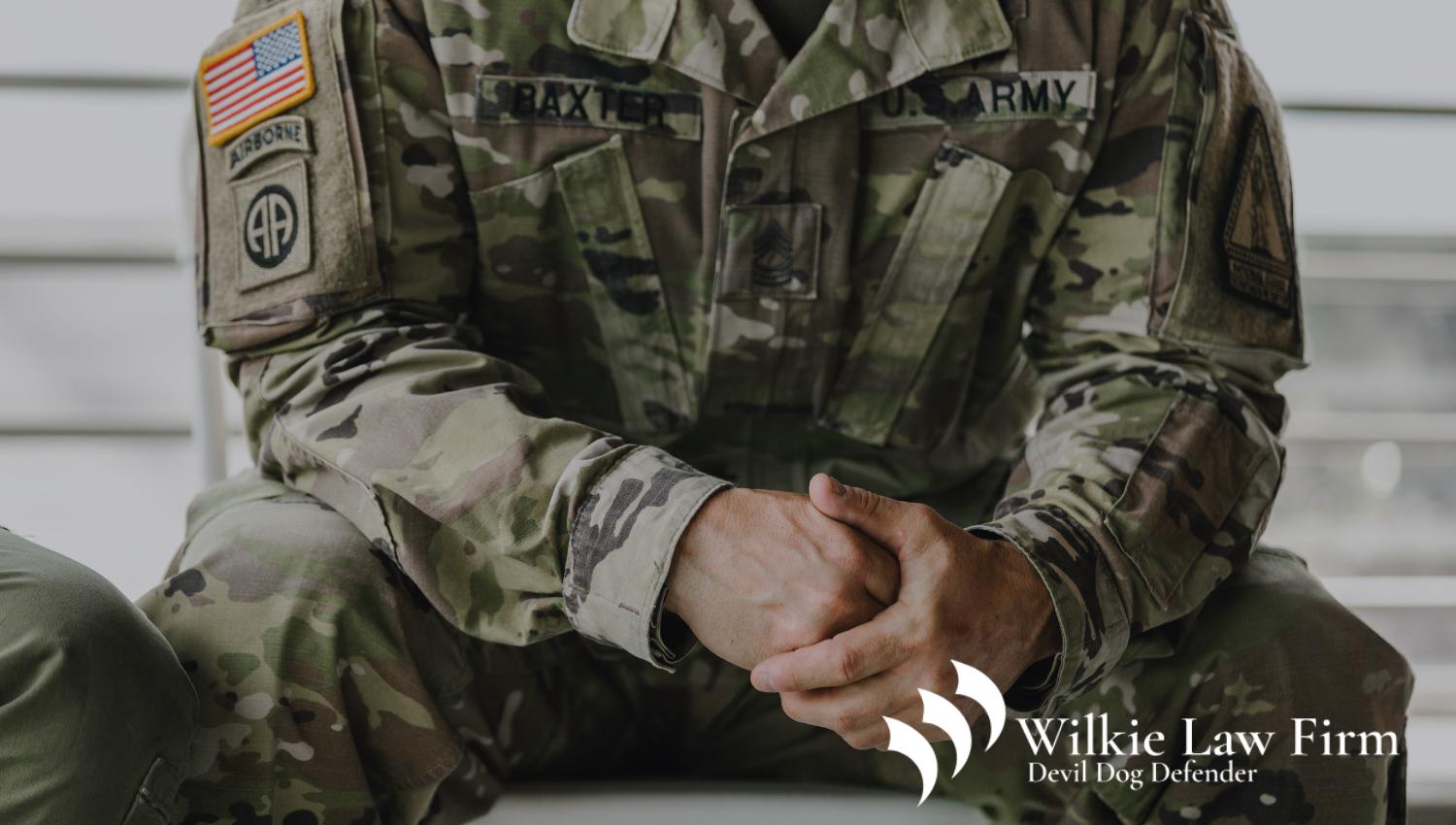Officer Misconduct Military Lawyer
Defense for Military Officer Misconduct Charges
Home » Military Defense Lawyer » Officer Misconduct Military Lawyer
Military Counsel
Military Officer Misconduct Lawyer
Officers in the military are held to a very high standard. As such, allegations of misconduct are not to be taken lightly, as the potential repercussions could have a permanent impact on your future and your military career.
When service members face accusations of officer misconduct, it’s important that they seek the assistance of skilled legal counsel. A dedicated military criminal defense lawyer like Aden Wilkie of the The Wilkie Law Group can help provide knowledge and guidance to navigate the complexities of the military justice system, ensuring that your rights and best interests are aggressively fought for.
Mr. Wilkie and his legal team will work tirelessly to build an excellent defense strategy, thoroughly analyzing evidence to challenge the prosecution’s case and overall advocating for your innocence or the most favorable outcome. With a reputable military defense lawyer like Aden Wilkie on your side, you can rest assured knowing your case will be handled with the utmost professionalism and diligence, providing you with the best opportunity to protect your military career and secure a promising resolution.

The information contained on this page is meant to inform the reader on the topic but is not intended be used as a substitute for legal advice from a qualified and experienced criminal defense attorney. In cases like this time is typically not on your side, so do not wait to consult with a qualified counsel.
What is Considered Officer Misconduct in the Military?
In the military, officer misconduct refers to behaviors that violate military laws and regulations and do not align with the expected standards of conduct for officers. This includes a broad range of both actions and omissions (failures to act) that compromise the integrity, professionalism, and effectiveness of an officer’s role.
Officers are expected to uphold higher standards of behavior and ethical conduct. So, while enlisted members also have their own set of misconduct regulations, officer misconduct carries additional weight due to the higher rank, responsibilities, and leadership position involved.
UCMJ Article 133 – Conduct Unbecoming an Officer & a Gentleman
Service members of the United States Military are subject to a unique set of laws called the Uniform Code of Military Justice (UCMJ). Within this Code are several articles outlining different areas of military law and what is considered a violation of these laws. Officer misconduct, formally known as Conduct Unbecoming an Officer and a Gentleman, can be found in UCMJ Article 133.
This particular article emphasizes the military requirement of safeguarding an individual’s status as an officer. Consequently, its purpose is to establish thresholds of tolerance for behavior that falls short of the moral characteristics expected from an exemplary officer and a true gentleman. This article also encompasses acts that can be penalized under other Articles of the UCMJ and is often added to a separate specific offense.
Common Misconduct Charges for Military Officers
There are several common misconduct charges that military officers may face. Some examples include:
- Dereliction of Duty – When an officer fails to fulfill their responsibilities or neglects their duties
- Fraternization – fraternization in the military refers to improper relationships between officers and enlisted personnel, i.e., dating, romantic involvement, or favoritism
- False Official Statement – making false statements or providing misleading information during official military investigations, paperwork, or proceedings
- Sexual Misconduct – includes offenses such as sexual assault, sexual harassment, or any form of non-consensual or inappropriate sexual behavior
- Misuse of Government Funds – charges related to financial impropriety, such as embezzlement, fraud, or misusing government funds for personal gain
- Violation of Orders – officers are expected to comply with lawful orders from superior officers
- Drug or Alcohol-Related Offenses – offenses such as illegal military drug use, excessive drinking, or operating a vehicle under the influence
Keep in mind that certain charges and the way in which they are classified may vary depending on the specific branch of the military and jurisdiction in question.
Penalties for Military Officer Misconduct Charges
Penalties for military officer misconduct charges are determined by the applicable military law and the severity of the offense. Depending on whether the offense is considered major or minor misconduct, service members may face adverse administrative action, a board of inquiry, non-judicial punishment (NJP), detachment for cause, or courts-martial.
Adverse Administrative Actions
Although specific adverse administrative actions may differ among service branches, all branches have provisions for such actions. Commanders can initiate these actions against their subordinates for instances of alleged underperformance on the job or minor misconduct that falls below the threshold for an Article 15 or court-martial.
Board of Inquiry
The Board of Inquiry (BOI) consists of three senior-ranking officers who conduct a hearing, evaluating evidence and hearing arguments. The board then determines if the presented evidence supports the alleged misconduct and whether it warrants disciplinary action, such as a recommendation for separation from service or other administrative measures.
Non-Judicial Punishment
In every branch of service, commands have the authority to utilize non-judicial punishment (NJP) when addressing minor violations of the Uniform Code of Military Justice. NJP, also known as Article 15 of the UCMJ, involves a commanding officer imposing disciplinary measures without a court-martial. The officer may receive penalties such as loss of pay, restriction of privileges, extra duties, or even a written reprimand.
Court-Martial
Facing a court-martial is a serious and high-stakes situation. It involves formal legal proceedings where a military court hears the case in a trial setting, assesses evidence, and determines guilt or innocence. If an officer is found guilty, they face severe penalties such as imprisonment, dishonorable discharge, reduction in rank, or forfeiture of pay. Given the severity of these potential consequences, it’s important that you equip the help of an experienced court martial lawyer like Aden Wilkie as soon as possible.
Detachment for Cause
Facing detachment for cause (DFC) involves the removal of an officer from their position due to serious misconduct, ethical violations, or failure to meet the expected standards of conduct and may lead to administrative separation from the military. DFC is not a punishment in and of itself, but is used in conjunction with other penalties following an officer misconduct conviction.
Facing Officer Misconduct Charges? Experienced Military Defense Attorney Aden Wilkie Can Help
If you find yourself facing officer misconduct charges, whether you are a service member in the Air Force, Army, Marine Corps, Navy, or Coast Guard, it is crucial that you have a trusted advocate by your side from the very beginning. That’s where dedicated military defense attorney Aden Wilkie of The Wilkie Law Group comes in.
While you may be assigned a uniformed attorney for your case, private military defense attorney Aden Wilkie brings an unparalleled level of experience to military proceedings with his 23 years of experience in the field. With such extensive experience in the military justice system, you can rest assured knowing that Mr. Wilkie has the legal skill and resources necessary to navigate the complexities of your case.
Call the Devil Dog Defender Today
If you are an officer facing allegations of misconduct, Aden Wilkie and his skilled legal team are committed to providing you with the best defense possible. With a comprehensive understanding of military law and relentless determination to protect your rights, The Wilkie Law Group ensures that you receive the guidance and support you need to fight your charges. To speak with an attorney regarding your officer misconduct case, call our North Carolina law office at (910) 333-9626 or reach out to us online today.





